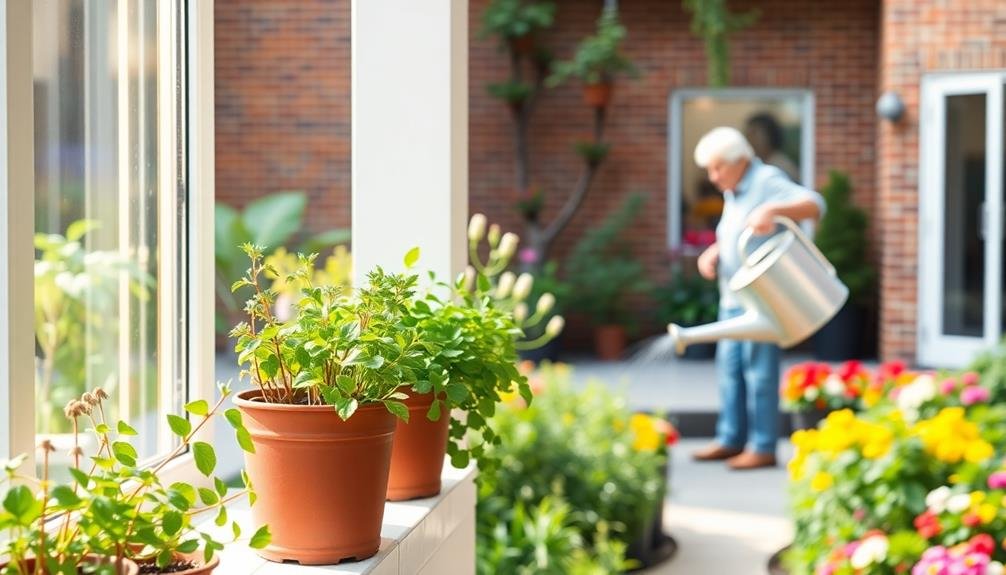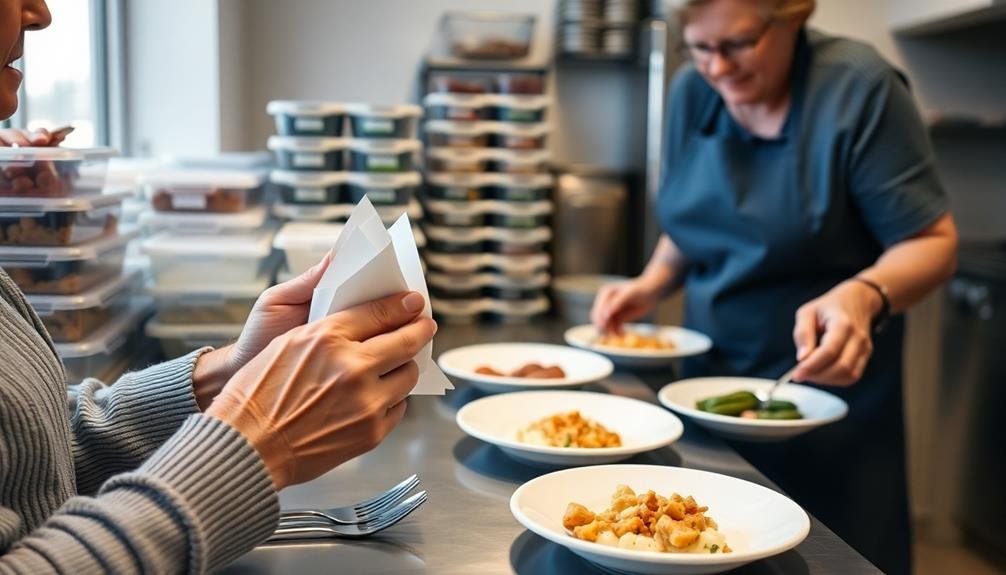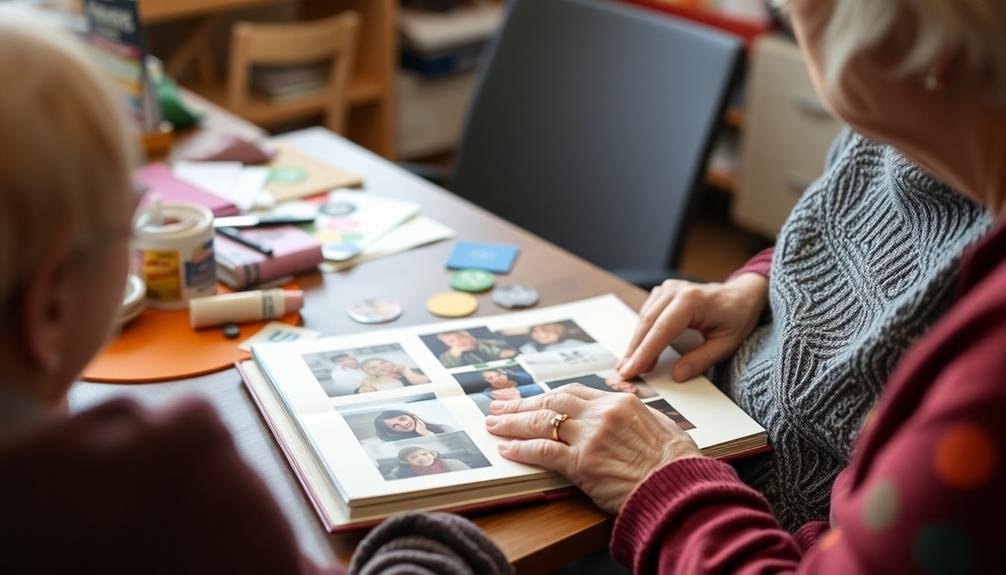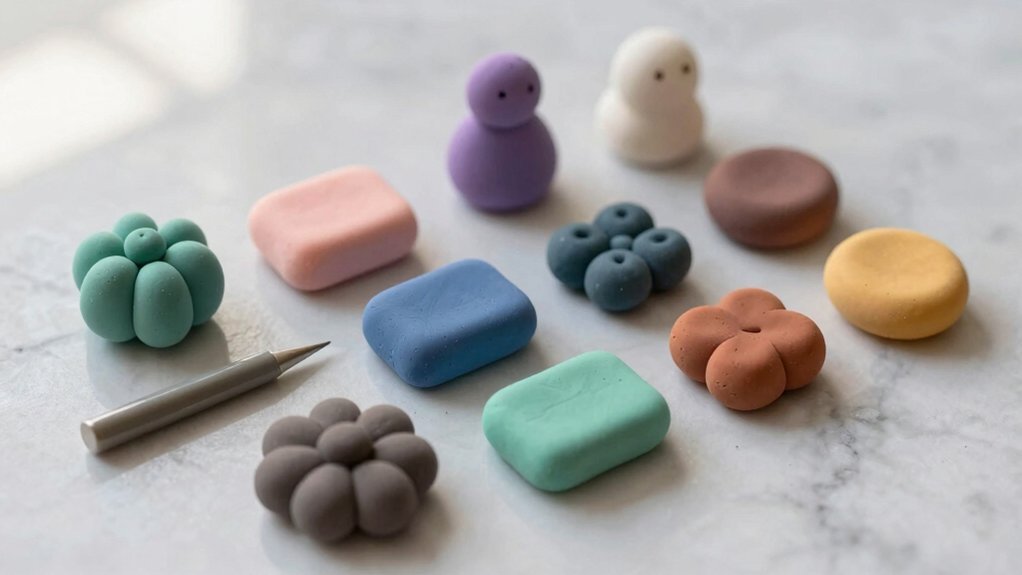As an introvert, you can make a significant impact at senior centers through quieter activities. You might organize books and magazines, assist with computer tasks, or tend to gardens. Creating handmade greeting cards or preparing meals allows for independent work. Writing letters for seniors or researching local resources provides valuable support without extensive social interaction. Maintaining bulletin boards keeps information current, while offering quiet companionship through reading sessions fosters meaningful connections. These tasks let you contribute in a comfortable way, using your strengths to enhance seniors' lives. There's a wealth of opportunities to explore that align with your preferences and skills.
Organizing Books and Magazines

At many senior centers, bookshelves and magazine racks often need attention. As an introvert, you can make a significant impact by volunteering to organize these reading materials.
Start by sorting books and magazines into categories, such as fiction, non-fiction, and periodicals. You'll find this task allows you to work independently and at your own pace, which suits your introverted nature.
When organizing, check for outdated materials and remove them, ensuring seniors have access to current information. Arrange books alphabetically by author or subject, making them easy to locate. For magazines, organize them by date or topic, depending on the center's preference. You can also create a simple cataloging system to help residents find what they're looking for quickly.
Consider setting up a cozy reading nook with comfortable seating and good lighting. This quiet space will be appreciated by both introverted and extroverted seniors alike.
Assisting With Computer Tasks
Many seniors struggle with technology, making computer assistance a valuable service at senior centers. As an introvert, you can offer one-on-one support, helping residents maneuver through the digital world at their own pace.
You'll find this role allows for focused interactions without the pressure of large group settings. Start by teaching basic computer skills like turning on the device, using a mouse, and maneuvering around the desktop.
You can then progress to more advanced tasks such as setting up email accounts, conducting internet searches, or using video chat applications to connect with family members.
Consider creating simple, step-by-step guides for common tasks that seniors can reference when you're not around. This approach allows you to share your knowledge without constant verbal explanations.
You might also help seniors learn to use smartphones or tablets, showing them how to download apps, adjust settings, or use accessibility features.
Gardening and Plant Care

If you're an introvert who loves plants, you'll find plenty of opportunities to help at senior centers.
You can assist with indoor plant maintenance, ensuring residents have vibrant greenery in their living spaces.
For those who enjoy outdoor activities, you might contribute to vegetable gardening projects or help design colorful flower beds that bring joy to the seniors.
Indoor Plant Maintenance
Introverts often find solace in tending to indoor plants, making this activity a perfect fit for volunteering at senior centers.
You'll contribute to the center's ambiance while working quietly and independently. Start by evaluating the existing plants and their needs. Check for signs of disease, pests, or dehydration, and address these issues promptly.
Develop a watering schedule based on each plant's requirements. Some may need daily attention, while others thrive with less frequent watering.
Don't forget to dust leaves regularly to maintain their health and appearance. Prune dead or yellowing leaves to encourage new growth and maintain a tidy appearance.
Consider introducing new plants to brighten up common areas or residents' rooms. Choose low-maintenance varieties that thrive indoors, such as pothos, spider plants, or peace lilies.
You can also propagate existing plants to create new ones, saving the center money while expanding its greenery.
If you're comfortable, share your plant care knowledge with interested residents. This can be done through written care instructions or one-on-one conversations, allowing you to connect with others while staying within your comfort zone.
Outdoor Vegetable Gardening
Tranquility awaits introverts in the domain of outdoor vegetable gardening at senior centers. You'll find peace in tending to plants while contributing to the community's well-being.
Start by familiarizing yourself with the center's existing garden or proposing a new one. Research which vegetables grow best in your climate and season.
You can help with soil preparation, planting seeds, and maintaining the garden beds. Water the plants regularly, remove weeds, and monitor for pests or diseases. As an introvert, you'll appreciate the quiet, methodical nature of these tasks.
You might also install support structures for climbing plants or set up a composting system.
Harvesting vegetables is another rewarding activity. You can assist in picking ripe produce and organizing it for the center's kitchen or distribution to residents.
Consider creating informational labels for each plant, helping seniors learn about what's growing. If you're comfortable, offer gardening tips to interested residents or staff members. Your expertise can make a significant impact without requiring extensive social interaction.
Flower Bed Design
Flower bed design offers another rewarding avenue for introverts to contribute at senior centers. You can use your creativity and attention to detail to plan beautiful, low-maintenance gardens that residents can enjoy year-round. Start by evaluating the available space and sunlight conditions, then select plants that thrive in those environments.
Consider the following design elements:
| Element | Description |
|---|---|
| Color | Choose complementary or contrasting hues |
| Texture | Mix smooth and rough foliage |
| Height | Layer plants from tall to short |
| Season | Include plants for year-round interest |
As you design, focus on creating visually appealing arrangements that are also easy for seniors to maintain. Opt for perennials that come back yearly and drought-resistant plants to reduce watering needs. Include wide paths and raised beds for accessibility.
You can work independently on the design process, researching plant options and sketching layouts. When it's time to implement your plan, coordinate with staff to organize small planting sessions. This allows you to interact with residents in a structured, purposeful way while transforming the senior center's outdoor spaces into vibrant, living works of art.
Creating Handmade Greeting Cards
You'll find creating handmade greeting cards for seniors to be a rewarding activity that allows for personal expression.
As you craft unique designs tailored to each resident's interests, you're engaging in a therapeutic process that can calm your mind and boost creativity.
Your thoughtful messages inside the cards will provide comfort and connection to seniors, showing them they're remembered and appreciated.
Personalized Designs for Seniors
Creating handmade greeting cards for seniors is a thoughtful way to brighten their day and engage in a creative activity. When personalizing designs for seniors, take into account their individual interests and preferences. You can incorporate elements that reflect their hobbies, favorite colors, or past experiences. For example, if a senior enjoys gardening, you might include pressed flowers or botanical illustrations in your card design.
Pay attention to readability by using larger fonts and high-contrast color combinations. Avoid overly busy patterns that might be difficult for seniors with vision impairments to appreciate. Instead, opt for clear, simple designs with bold lines and easily recognizable shapes.
You can also create cards that celebrate specific milestones or events in the seniors' lives, such as birthdays, holidays, or family visits. Adding personal touches like hand-written messages or small photographs can make the cards even more meaningful.
Don't forget to take into account the tactile experience of the card – using textured papers or adding embellishments like ribbons or buttons can make the cards more engaging for seniors with limited vision.
Therapeutic Crafting Benefits
Engaging in the process of crafting handmade greeting cards for seniors offers numerous therapeutic benefits. As you create these personalized cards, you'll find yourself immersed in a calming and meditative activity that reduces stress and anxiety. The repetitive motions of cutting, folding, and decorating can be soothing, helping you to focus on the present moment and forget about daily worries.
You'll also experience a boost in self-esteem and confidence as you develop your artistic skills and see the tangible results of your efforts. Creating cards allows you to express your creativity and emotions in a meaningful way, which can be particularly beneficial if you struggle with verbal communication.
Moreover, crafting greeting cards for seniors fosters a sense of purpose and connection. You're not just making art; you're creating something that will bring joy to others. This act of giving can improve your mood and overall well-being.
Additionally, the process of designing and personalizing cards encourages cognitive stimulation, enhancing problem-solving skills and maintaining mental agility. By engaging in this therapeutic activity, you're not only helping seniors but also nurturing your own emotional and mental health.
Meaningful Messages Inside Cards
While the act of crafting cards is rewarding, the messages inside hold equal importance. As an introvert, you can make a significant impact by carefully choosing your words to uplift and encourage seniors.
Start by considering the recipient's interests, hobbies, or life experiences. Personalize your message to show that you've put thought into their unique situation.
Use positive and affirming language to boost their spirits. Share a genuine compliment or express admiration for their resilience. If appropriate, include a funny anecdote or joke to bring a smile to their face.
Don't shy away from addressing any challenges they might be facing; offer words of support and encouragement. Consider including a thoughtful quote that resonates with their situation or reflects wisdom they've shared.
If you're comfortable, share a brief personal story that demonstrates how they've positively influenced you or others. Remember to write legibly and use a larger font size if needed.
Your carefully crafted message can become a cherished keepsake, providing comfort and joy long after the card is received.
Meal Preparation and Packaging

Meal preparation and packaging offer introverts a perfect opportunity to contribute at senior centers without constant social interaction. You can work behind the scenes, focusing on tasks that don't require extensive conversations. In the kitchen, you'll find a variety of roles that suit your preference for quieter environments.
You might chop vegetables, measure ingredients, or assemble meals. These tasks allow you to work independently while still being part of a team. Packaging meals for delivery is another excellent option, as it involves organizing and labeling containers with minimal social interaction.
Here's a table showcasing some introvert-friendly roles in meal preparation and packaging:
| Task | Skill Required | Interaction Level |
|---|---|---|
| Chopping vegetables | Knife skills | Low |
| Portioning meals | Attention to detail | Low |
| Labeling containers | Organization | Low |
| Sanitizing workspaces | Thoroughness | Low |
Mending and Repairing Clothing
Mending and repairing clothing offers another excellent opportunity for introverts to help at senior centers. If you're skilled with a needle and thread, you can provide a valuable service to seniors who may struggle with fine motor tasks.
You'll work quietly and independently, focusing on repairing torn seams, replacing buttons, or patching holes in beloved garments.
To get started, reach out to the senior center's volunteer coordinator and express your interest in offering mending services. They'll likely be thrilled to have someone with your skills.
You can set up a small workstation in a quiet corner, where seniors can drop off items needing repair. This setup allows you to work at your own pace without the pressure of constant social interaction.
Consider creating a simple form for seniors to fill out, detailing the repairs needed. This approach minimizes verbal communication while ensuring you understand each task.
As you complete the mending, you'll feel a sense of accomplishment knowing you've helped seniors maintain their wardrobes and preserve cherished clothing items.
Your quiet contributions will make a significant impact on the seniors' daily lives and comfort.
Crafting Memory Books

Crafting memory books provides a meaningful way for introverts to help seniors preserve their life stories and cherished memories. You can assist residents in organizing photos, mementos, and written recollections into beautifully bound albums. This quiet, focused activity allows you to work one-on-one with seniors or in small groups, creating a comfortable environment for introverts.
Start by gathering materials like scrapbooks, acid-free paper, and archival-quality adhesives. You'll help seniors select and arrange photos, encouraging them to share the stories behind each image. As they reminisce, you can jot down captions or short anecdotes to accompany the pictures.
Don't forget to include other mementos like ticket stubs, postcards, or pressed flowers to add texture and depth to the memory books.
You can also assist seniors in writing brief autobiographies or recording family recipes to include in their books. This process not only preserves precious memories but also provides cognitive stimulation for the elderly.
Organizing Donations and Supplies
You'll find organizing donations and supplies a perfect fit for your introverted nature.
Start by sorting donated items efficiently, developing a system that streamlines the process.
Implement inventory management techniques and create organized storage systems to guarantee everything has its place and can be easily accessed when needed.
Sorting Donated Items Efficiently
At senior centers, efficient sorting of donated items is vital for maximizing their impact. As an introvert, you'll excel at this task, which requires focus and attention to detail.
Start by creating a system for categorizing items, such as clothing, books, medical supplies, and personal care products. Set up designated areas for each category to streamline the sorting process.
When sorting, inspect each item carefully for quality and cleanliness. Discard anything that's damaged, stained, or unusable. Group similar items together, such as organizing clothing by size and type. For books, separate them by genre or reading level. Medical supplies should be sorted by type and expiration date.
Create an inventory list as you sort, noting quantities and any high-value items. This will help the center track donations and identify needs. Use your organizational skills to label boxes and shelves clearly, making it easier for staff and volunteers to find specific items.
Don't forget to sanitize items when necessary, especially medical equipment or frequently handled objects.
Your meticulous approach will guarantee that donations are properly sorted, stored, and ready for distribution to seniors in need.
Inventory Management Techniques
Effective inventory management is an introvert's playground at senior centers. You'll find satisfaction in organizing and tracking donated items and supplies without the need for constant social interaction.
Start by implementing a digital inventory system, using spreadsheets or specialized software to record item details, quantities, and locations. This allows you to maintain accurate records and easily identify when supplies are running low.
Create a logical storage system, grouping similar items together and labeling shelves clearly. You can develop a color-coding system for different categories, making it easier to locate items quickly.
Implement a first-in, first-out (FIFO) approach to guarantee older items are used before newer ones, reducing waste.
Conduct regular inventory audits to reconcile physical counts with digital records. This task suits your detail-oriented nature and helps prevent shortages or overstock situations.
Set up automatic reorder points for frequently used items, streamlining the replenishment process. By mastering these inventory management techniques, you'll contribute considerably to the senior center's efficiency while working in a role that aligns with your introverted strengths.
Creating Organized Storage Systems
Introverts can immerse themselves in creating organized storage systems for donations and supplies at senior centers. You'll find this task aligns well with your strengths, allowing you to work independently and methodically.
Start by evaluating the current storage situation and identifying areas for improvement. Develop a clear categorization system for items, considering factors like frequency of use, size, and purpose.
Implement a labeling system using color-coding or alphanumeric identifiers to make locating items easier. Design shelving units or storage containers that maximize space efficiency while guaranteeing easy access.
Consider using clear plastic bins for visibility and stackability. Create a digital inventory system to track donations and supplies, making it simple to identify when restocking is necessary.
Establish protocols for accepting, sorting, and storing new donations. Train staff and volunteers on the new system, providing written guidelines for reference.
Regularly review and update the system to verify it remains effective. By creating an organized storage system, you'll contribute notably to the senior center's efficiency and help staff and volunteers locate needed items quickly, ultimately improving the quality of care for seniors.
Writing Letters for Seniors

While many seniors cherish receiving handwritten letters, they often struggle to write them due to physical limitations. As an introvert, you can make a significant impact by volunteering to write letters for seniors. This quiet, one-on-one activity allows you to connect with residents without feeling overwhelmed by large social gatherings.
To get started, ask the senior center staff about their letter-writing program. They'll likely provide you with guidelines and match you with seniors who need assistance.
When meeting with a senior, listen attentively as they dictate their thoughts. Encourage them to share stories, memories, and feelings they'd like to convey to their loved ones.
As you write, focus on capturing the senior's voice and personality. Use clear, legible handwriting and read the letter back to verify accuracy. You may need to gently guide the conversation if the senior loses track, but avoid imposing your own words or ideas.
This volunteer opportunity not only helps seniors maintain connections with family and friends but also provides you with a meaningful way to contribute without stepping too far out of your comfort zone.
Maintaining Bulletin Boards
Bulletin boards play a key role in keeping seniors informed and engaged at care centers. As an introvert, you can make a significant impact by maintaining these essential communication hubs.
You'll find this task allows you to work independently while still contributing to the community's well-being.
Start by coordinating with staff to understand the center's needs and preferences for bulletin board content. Then, create a schedule for regular updates, ensuring information stays current and relevant.
You'll need to:
- Remove outdated notices and clean the board surface
- Design and create eye-catching displays for upcoming events
- Organize important information in a clear, easy-to-read format
When crafting displays, consider using large, legible fonts and high-contrast colors to accommodate seniors with visual impairments. Incorporate a mix of text and images to make the information more engaging and accessible.
Don't forget to include essential details like dates, times, and locations for events.
Researching Local Resources

In addition to maintaining bulletin boards, you can make a valuable contribution by researching local resources for seniors. This task allows you to work independently while providing essential information to the senior center and its members.
Start by creating a thorough list of local organizations, services, and programs that cater to older adults. Include healthcare providers, transportation services, meal delivery programs, and social activities.
You'll need to verify the accuracy of each resource, including contact information, eligibility requirements, and any associated costs. Don't forget to research online resources and mobile apps that can benefit seniors.
As you gather information, organize it in a user-friendly format, such as a spreadsheet or database. This will make it easy for staff and volunteers to access and update the information as needed.
Consider reaching out to local businesses and organizations to inquire about senior discounts or special programs. Your research can help seniors save money and access services they mightn't have known about otherwise.
Quiet Companionship and Reading
Occasionally, one of the most valuable services you can offer at a senior center is quiet companionship. As an introvert, you're well-suited to provide a calming presence for seniors who may feel overwhelmed by constant chatter or activities.
Your ability to sit comfortably in silence can be a welcome respite for residents who crave peaceful moments.
Reading to seniors is another excellent way to contribute. Many elderly individuals struggle with vision problems or can't hold books steady, making it difficult for them to enjoy literature independently.
You can brighten their day by sharing stories, news articles, or even personal letters from family members.
Consider these quiet ways to help:
- Offer one-on-one reading sessions, allowing seniors to choose their preferred material
- Create a small, intimate book club for residents who enjoy discussing literature
- Assist with writing letters or emails to help seniors stay connected with loved ones
Your introverted nature can be a tremendous asset in these scenarios.
You'll provide meaningful interactions without overwhelming seniors who may tire easily from excessive social stimulation.
Frequently Asked Questions
How Can Introverts Handle Unexpected Social Interactions at Senior Centers?
You can handle unexpected social interactions by taking deep breaths, using brief but polite responses, and excusing yourself if needed. It's okay to set boundaries. Remember, you're not obligated to engage in lengthy conversations you're uncomfortable with.
What Training or Certifications Might Be Required for Volunteering?
You'll likely need basic volunteer training from the senior center. They may require background checks and health screenings. Some roles might need specific certifications, like CPR or food handling. Always check with the center for their exact requirements.
Are There Opportunities for Remote or Virtual Volunteering for Introverts?
You'll find numerous remote volunteering options for introverts. You can contribute by making phone calls, offering virtual tech support, writing letters, or creating digital content. Many organizations now offer virtual programs that cater to introverted volunteers' preferences.
How Can Introverts Set Boundaries While Volunteering at Senior Centers?
You can set boundaries by clearly communicating your limits, choosing tasks that align with your comfort level, and scheduling breaks. Don't hesitate to decline activities that overwhelm you. Remember, it's okay to prioritize your well-being while volunteering.
What Should Introverts Do if They Feel Overwhelmed During Their Volunteer Shift?
If you're feeling overwhelmed during your shift, take a short break in a quiet area. Step outside for fresh air, practice deep breathing, or excuse yourself to the restroom. Don't hesitate to communicate your needs to the supervisor.
In Summary
You've seen that there are many ways introverts can contribute at senior centers without feeling overwhelmed. By playing to your strengths and choosing activities that align with your personality, you'll make a meaningful impact while staying in your comfort zone. Remember, your quiet presence and behind-the-scenes efforts are just as valuable as more outgoing roles. Don't hesitate to reach out to your local senior center and explore how you can help in your own unique way.





Leave a Reply